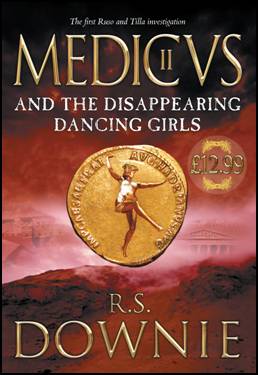


|
|

|
|
|
Medicus and the Disappearing Dancing Girls is an original detective novel set in Roman Britain, and introduces a significant new talent in R. S. Downie. Both comic and beguiling, there is already a significant buzz building around this, the first, of what will become the Medicus series.
A doctor’s life is never easy. Particularly when the breakthroughs of medical history lie centuries in the future and financial destitution and divorce have driven you to a distant, damp and depressing outpost of the Roman Empire: Britannia. Could things get any worse?
Probably. Rescuing slave girls (even if they do have attractive eyes) is never a good idea; sharing a house with a lazy colleague who is far too handsome for his own good is never going to be peaceful; and finally getting dragged into a situation that suggests a serial killer may be stalking your local bar is only ever going to end badly.
Ruso’s gods are not smiling on him in Britannia. What is a poor doctor to do? Set aside his Concise Guide to Military First Aid, persuade his slave girl, Tilla, to cook – and inadvertently track down a murderer?
R.S.Downie won the Fay Weldon section of BBC 3’s End of Story competition; and she was also runner-up in the Mail on Sunday’s ‘Start a Novel’ competition. This is her first novel. She is married with two sons and lives in Buckinghamshire.
Shots Ezine decided to ask R. S. Downie a little about this interesting new novel
Lurking round the Romans by R S Downie

There you are, quietly minding your cows and your own business, disturbed only by the occasional bad harvest or a quarrel with the tribe next door, when they turn up. They are several thousand men with sharp swords. They are overpaid, oversexed and over here.
Like it? No, of course you don’t like it. And you know that if you and all the neighbours banded together you could get rid of the invaders by the end of the month. But some people just don’t see it that way. Some of the other tribes are rather partial to central heating and glass windows and shops and fine wine and flushing toilets.
Besides, their warriors usually win. Not because they’re braver, or cleverer, but because they have more time to practice. They’re full-time professionals, on a salary paid for out of your taxes.
What’s worse, they’re flirting with your daughters. They have no intention of marrying your daughters, of course. They aren’t allowed to. So what are you going to do about it?
That was the question that led, by a circuitous route, to ‘Medicus and the Disappearing Dancing Girls’. Other questions arose during the writing - principally, ‘Why did I start this?’
It seemed like a good idea when I stood in the museum at Housesteads on Hadrian’s Wall, reading a caption that said Roman soldiers weren’t permitted to marry, but were allowed to have ‘relationships with local women’. The nature of these relationships wasn’t specified, although the discovery of male and female skeletons buried under the floor of a nearby building suggested that for two people at least, things had gone horribly wrong.
Shortly afterwards a couple more thoughts occurred to me: firstly, that I knew nothing about Roman Britain, and secondly, that I was too embarrassed to ask.
I’ve always admired crime writers who are brave enough to do their research by cruising around in police cars, or tape-recording interviews with experts. Being a wimp, I was forced to adopt the tactic of Research by Lurking. Even that wasn’t as safe as I’d hoped.
Lurking in public places is harmless enough, but I hung around one poor re-enactor for so long that he was convinced I was working for a rival who was trying to steal his show. Lurking around the internet raised the interesting question of who had been Googling ‘brothels’ and ‘poisons’ on the family computer, and lurking around archaeologists led to addiction. I now have the trowel and the silly hat and if only I could think up a plot involving an intricate knowledge of the patterns on Roman box flue tiles, it would all be worth it.
Lurking, as I discovered, is much like archaeology. You have little control over what you’re going to find. Some days nothing much turns up. But there was the strange afternoon when a fellow-digger investigated a gentle dip in the ground and turned up an unexpected skeleton. And then there was the day when, skimming through a book on Roman social history, I found out that the emperor Hadrian tried to stop owners selling their slaves for use as prostitutes or gladiators. The seeds of the first Medicus book were sown.
Now I just have to find a way to work those box flue tiles into Book Two…
|

| Webmaster: Tony 'Grog' Roberts [Contact] |